Keeping your lawn in tip-top shape is not only satisfying in its own right, it can also help increase your property value.
But weeds represent a serious foe in the battle for a beautiful lawn. So, a lot of homeowners end up strolling down the lawn-care aisle at their local big-box retailer to pick up a spray or powder designed to kill weeds.
The problem is, some of these products may not be safe for your dog.
We’ll cover everything you need to know about using weed killers around your pets below.
We’ll explain how they work, discuss some of the dangers they may present, and identify a few that are unlikely to harm your pet in any way, shape, or form.
Best Pet-Safe Weed Killers: Quick Picks
- #1 Dr. Kirchner Natural Weed Killer [Best Overall Pet-Safe Weed Killer] — Made with strong vinegar, soap, and salt, this glyphosate-free weed killer is effective, easy to use, and safe for four-footers.
- #2 Natural Armor 30% Home & Garden Vinegar [Most Affordable Pet-Safe Weed Killer] — Formulated with super-strong 30% vinegar, this product will safely kill weeds without breaking the bank.
- #3 Preen Weed Preventer [Best Pet-Safe Pre-Emergent] — If you’d rather prevent weeds from coming up instead of battling with them after they’ve germinated — and you want to do so in dog-safe fashion — this product is the ideal choice.
The 10 Best Dog-Safe Weed Killers for Your Yard
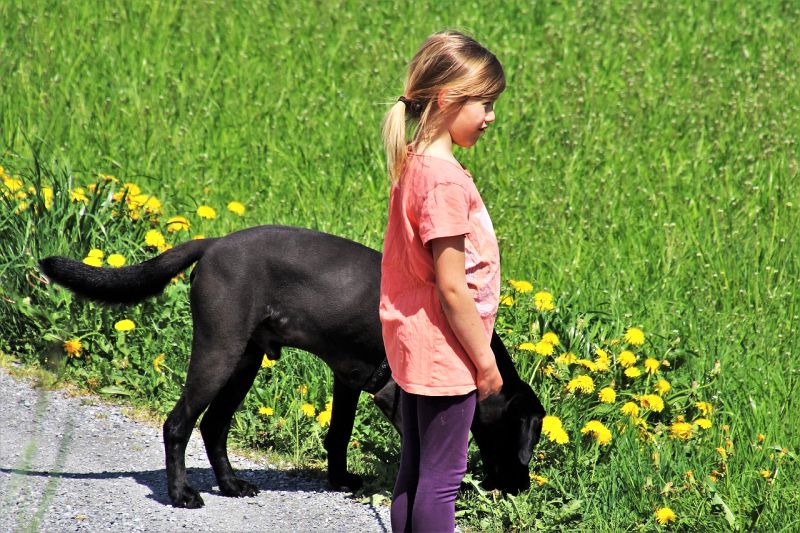
Many of the most popular weed killers may be dangerous to dogs, but there are options available that shouldn’t represent much of a threat at all (you still wouldn’t want your pet to drink or bathe in them, but when used properly, they shouldn’t be dangerous).
We’ll discuss 10 of the best options below.
1. Dr. Kirchner Natural Weed Killer
This is a sponsored placement, in which an advertiser pays a fee to be featured in this article. Learn more
About: Dr. Kirchner Natural Weed Killer is a seawater-based weed killer that the manufacturer claims is safe for people, pets, chickens, horses, and the environment.
And unlike some other weed killers, which do not provide a full list of ingredients, Dr. Kirchner Natural Weed Killer lists all four ingredients used: Sodium chloride (salt), water, vinegar, and soap. The salt included in the formula does most of the weed-killing, but the vinegar and soap help too.
Features:
- Primary weed-killing ingredient is sodium chloride (salt)
- Non-selective weed killer, so spray with discretion
- Offered in several sizes, ranging from 1 quart to a whopping 640 ounces
- Made in the USA
Pros
- Received lots of positive reviews — including from dog owners
- Many users were surprised that it killed weeds in a matter of hours
- Contains only four pet-safe active ingredients
Cons
- Some of the spray nozzles didn’t work particularly well
- One of the most expensive pet-safe weed killers
2. Natural Armor 30% Home & Garden Vinegar
This is a sponsored placement, in which an advertiser pays a fee to be featured in this article. Learn more
About: Natural Armor 30% Home & Garden Vinegar is an all-natural, glyphosate-free weed killer that can also be used for a variety of other purposes, such as cleaning brick walkways, reducing soil pH, and polishing chrome.
In contrast to Natural Armor’s other pet-safe weed killer we discuss below (which contains a few different active ingredients), this one contains only a single ingredient: 30% vinegar.
Features:
- Made with super-concentrated vinegar
- Doubles as a strong deodorizer, making it perfect for outdoor kennel areas
- Spray option allows for easy application
- Comes with a 100% money-back guarantee
Pros
- Contains only a single, pet-safe active ingredient
- Very effective at killing weeds
- Can be used in a variety of different applications
Cons
- Some users complained that repeated applications were necessary to kill weed roots
- Spray-nozzle malfunctions were somewhat common
3. Green Gobbler Vinegar Weed Killer
This is a sponsored placement, in which an advertiser pays a fee to be featured in this article. Learn more
About: Green Gobbler Ultimate Vinegar Home & Garden is a vinegar-based weed killer that is designed to be a safer alternative to traditional weed killers. The primary active ingredient in Green Gobbler’s Ultimate Vinegar Home & Garden is (wait for it) vinegar.
Best of all, this pet-safe weed killer comes pre-mixed and a spray nozzle is included. Just screw the sprayer on the bottle and start blasting.
Features:
- Concentrated vinegar is the active ingredient
- Glyphosate-free formula
- Biodegradable and certified for organic use
- Easy-to-use spray design with nozzle included
Pros
- Users reported that it killed most weeds within 24 hours
- Ready-to-use product that doesn’t require dilution or mixing
- Spray nozzle reportedly works quite well
Cons
- Very strong vinegar odor
4. Natural Armor Weed & Grass Killer
This is a sponsored placement, in which an advertiser pays a fee to be featured in this article. Learn more
About: Natural Armor Weed & Grass Killer is an all-natural product designed to kill more than 250 different types of weeds and grasses. It is made from acetic acid (vinegar), citrus ingredients, sodium ingredients, essential oil, glycerin, and water.
The inclusion of citrus ingredients is noteworthy, as they help to give the product a relatively pleasant smell, unlike the strong vinegar odor associated with many other options.
Features:
- Active ingredients are sodium chloride, citric acid, and clove oil
- Requires no mixing prior to use
- Fast-acting formula starts working within hours
- Backed by a 100% money-back guarantee
Pros
- Effective on a broad array of weeds and plants
- Has a subtle citrus-like smell
- Backed by a money-back guarantee
Cons
- We wish they’d explain more about the ingredients used
- The spray nozzle gave some users fits
5. Preen Weed Preventer
This is a sponsored placement, in which an advertiser pays a fee to be featured in this article. Learn more
About: Preen Weed Preventer is a 100% natural lawn and garden product made from a single, pet-safe ingredient: corn gluten meal. Note that this isn’t a weed-killer in the conventional sense of the term; instead, it is a pre-emergent herbicide, which will prevent weed seeds from growing.
Safe for pets and effective, this is the best option for owners who’re trying to kill weeds before they even sprout.
Features:
- Blocks weed growth using corn gluten meal
- Doubles as a fertilizer
- Safe for use around plants that are at least 2 to 3 inches tall
- Made with 60% protein (40% more than competitors)
Pros
- Corn gluten meal is completely safe for your pooch
- This particular pre-emergent contains exceptionally protein-rich corn gluten meal
- Several users reported an overall improvement in lawn health
Cons
- Pricey
- Proper use is critical to achieve the desired results
- Won’t work on existing weeds
6. Natural Elements Weed Killer
This is a sponsored placement, in which an advertiser pays a fee to be featured in this article. Learn more
About: Natural Elements Weed Killer is a salt and vinegar-based formula that’s pet and family-friendly. Non-toxic and 100-percent biodegradable, it’s an earth-conscious option for guilt-free yard maintenance.
Just be aware that this weed killer reportedly exhibits broader efficacy than many other options. This is a selling point for some owners, but just be careful using it around plants you don’t want to kill.
Features:
- Effective against broadleaf weeds, clover, dandelions, and more
- Not intended for lawn usage (it will kill grass)
- Works within 24 hours of application
- Made in the USA
Pros
- Very highly rated by consumers
- The no-mix formula is very convenient
- This is one of the more affordable pet-friendly weed killers out there
Cons
- Some owners found it wasn’t effective against all weeds or plants
- Not all size options come with spray nozzles, so order with care
7. OrganicMatters Natural Weed Killer Spray
This is a sponsored placement, in which an advertiser pays a fee to be featured in this article. Learn more
About: OrganicMatters Natural Weed Killer Spray is a concentrated salt, vinegar, and clove oil formula that eliminates common weeds like dandelions and crabgrass. Just spray on with the included nozzle and enjoy organic, pet-friendly weed eradication.
Despite having a similar formula to many other pet-friendly weed killers, most owners were shocked at how quickly this product started wiping out their weeds.
Features:
- Eco-friendly, glyphosate-free formula
- Kills weeds within 24 hours
- Fast-drying recipe for worry-free application
- Comes with a 30-day manufacturer’s money-back guarantee
Pros
- Most owners report that it’s fast-acting and effective
- A relatively affordable pet-safe weed killer
- Formula is simple to apply, with no need for mixing
Cons
- Some users found the smell to be rather intense
- It’s a broad-spectrum weed killer, so use caution around vegetation you don’t want to eliminate
8. Just For Pets Weed Killer Spray
This is a sponsored placement, in which an advertiser pays a fee to be featured in this article. Learn more
About: Just For Pets Weed Killer Spray is a non-toxic, glyphosate-free formula that’s made by pet lovers for use in fur-friendly yards. With the included nozzle, just mist unwanted weeds and see results within hours.
And while all of the weed killers we recommend here are safe for pets when used properly, this one is the only one actually created by pet owners. This makes the product the best option for owners who don’t want to take any chances with their canine.
Features:
- Active ingredients include vinegar, salt, clove oil, and more
- Quick-drying formula
- Per the manufacturer, it’s effective against 250+ types of weeds
- Comes with a 100 percent money-back guarantee
Pros
- A great option for owners who prioritize safety above all other considerations
- Ready to use — just spray and go!
- A portion of each sale is donated to animal shelters across the US, which is always a win
Cons
- Use caution around lawns, as this will kill nearby grass
- Some owners had problems with the included sprayer
9. Energen Carolina LLC Vinegar Weed & Grass Killer
This is a sponsored placement, in which an advertiser pays a fee to be featured in this article. Learn more
About: Energen Carolina LLC’s Vinegar Weed & Grass Killer is a non-selective plant eliminator that works great against clover, ground ivy, crabgrass, and more. A glyphosate-free formula, this product is safe for use around pets and people once dried.
As an added bonus, this pet-safe weed killer is approved for organic use, and it can be sprayed around crops up to two days before harvest.
Features:
- Approved for use around organic crops
- Concentrated formula powers through stubborn weeds and unwanted grass
- Available in 1-quart and 1-gallon sizes
- Super-concentrated vinegar solution
Pros
- It’s effective but strong, so use caution around desirable plants
- The smell isn’t as offensive as other options
- Reviews praise this formula for being fast-acting and quick-drying
Cons
- The container doesn’t list the inactive ingredients
- There aren’t as many reviews for this product as some other options
10. ECO Garden Pro
This is a sponsored placement, in which an advertiser pays a fee to be featured in this article. Learn more
About: ECO Garden Pro is a phosphate-free formula that uses salt and vinegar to kill weeds without harming people or animals. See results within 24 hours and get back to weed-free outdoor fun with your four-footer.
Just note that this product does not come with a sprayer, and it is best-suited for serious gardeners, who’re comfortable transferring it into a spray-ready container.
Features:
- Eco-friendly solution that’s 100% biodegradable
- Effective against clover, dandelions, moss, and more
- Non-selective formula
- Made in the USA
Pros
- It works great, even on tall weeds
- Pre-mixed solution is ready to pour into a spray bottle
- The organic nature gets a thumb’s up from gardeners
Cons
- Some owners report that repeat applications were needed
- Since this is a non-selective mixture, use caution around plants and grass you’d like to keep
- No sprayer is included

How Do Traditional Weed Killers Work?
There are a variety of different weed killers on the market, and a lot of them use different active ingredients and work in different ways. We’ll take a look at three of the most common ones in widespread use below.
Glyphosate
Glyphosate (the primary active ingredient in Roundup) is one of the most commonly used weed killers in the world.
It is effective on plants that have already started growing, and it is usually produced in liquid form, which you can spray in the desired area.
Unlike some other herbicides, which only target some subset of plants (such as grasses or broad-leaved plants), glyphosate kills everything.
Many backyard gardeners, municipalities, and landscaping professionals use glyphosate, but it is the agricultural industry that consumes the bulk of that which is produced.
And that makes sense. After all, you may hate the dandelions growing on your lawn, but weeds represent lost money to farmers, as they compete with the crops being grown.

In fact, Monsanto – the company that manufactures Roundup (as well as a variety of other products) – sells seeds for crops that have been genetically modified so that they tolerate glyphosate.
This means that farmers can hose down their crops with the herbicide, safe in the knowledge that the genetically modified crops are the only plants that will survive.
2,4-D (Trimec)
2,4-D is another extremely common herbicide, and some sources identify it as the one in most widespread use.
2,4-D is a plant hormone that causes broad-leafed plants to grow in improper ways, which cause them to die. Unlike glyphosate, 2,4-D targets dicots (broad-leaved plants, including most “weeds”), while allowing monocots (like grasses) to live.
Accordingly, it is often used to control weed growth amid lawns.
Sethoxydim
Sethoxydim has the opposite effect of 2,4-D – instead of killing broad-leafed plants, it targets monocots (primarily grasses).
It is a post-emergent product, designed to be used on grass weeds that have already sprouted. It is effective on many, but not all, grasses that commonly cause problems for homeowners.
Sethoxydim works by inhibiting the growth of the undesired weeds. The meristems (locations of rapid cell division and growth) of the treated plants typically turn black within 48 hours, while the rest of the plant begins turning red or yellow within about one week.
Complete plant death usually occurs in about two weeks.
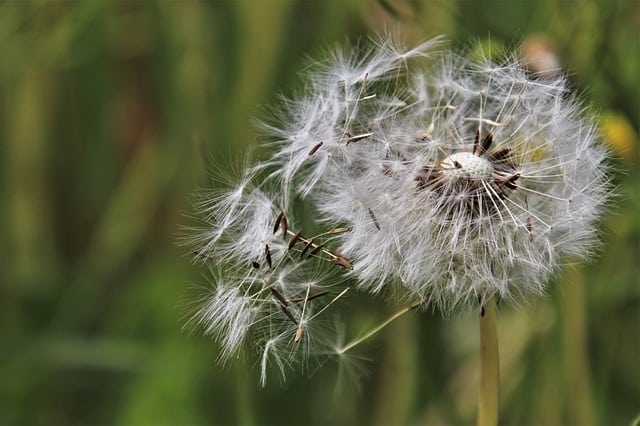
Are Traditional Weed Killers Like Roundup Pet Safe?
It isn’t entirely clear whether some of the popular weed killers are safe for pets. Simply put, we need more data to draw clear conclusions.
So, we’re left just trying to make the best decision on behalf of our pets.
On the one hand, these things are used so much that there’d probably be an epidemic of sick and dying dogs if they were – as How Stuff Works puts it – “violently toxic.”

But on the other hand, many weed killers can trigger mild to severe reactions in people and pets who have direct contact with them, and there is an increasing body of evidence that suggests some popular weed killers may be dangerous.
It is also important to note that dogs do appear to absorb many common herbicides – even when their owners don’t use the products themselves. Scientists at the University of Maryland have verified that several common herbicides are detectable in the urine of dogs whose owners didn’t use herbicides.
Is Glyphosate (Roundup) Safe for Pets?
Scientists have collected quite a bit of data about glyphosate (aka Roundup) over the last few decades.
Some studies appear to indicate that glyphosate is unlikely to cause illness or death, but other studies have yielded pretty harrowing information.
In fact, some of the data collected has been troubling enough to warrant glyphosate bans in some countries. Some, like the Netherlands, ban its non-commercial use, while others – such as Sri Lanka – banned the chemical completely (Sri Lanka did, however, reverse the law after heavy crop losses).
It has even been banned by the City of Miami (which is good news for owners looking to take their pooch to one of Miami’s best dog parks).
Glyphosate essentially works by destroying EPSP synthase – an enzyme that most plants need to survive. Theoretically, this means that it shouldn’t have much of an effect on dogs, as animals don’t produce EPSP synthase at all.
But glyphosate isn’t the only thing in Roundup – it also contains a variety of purportedly inert ingredients.
Unfortunately, it appears that some of these secondary ingredients may be dangerous. A 2013 study sought to verify this empirically, by testing glyphosate and the ostensibly inert ingredients used in its formulation.
The researchers did, in fact, find that weed killer’s inert ingredients (as well as the composite formulation) were problematic, regardless of whether or not glyphosate was dangerous. The study’s authors state as much quite plainly: “Here we demonstrate that all formulations are more toxic than glyphosate.” (In this context, they mean formulations containing glyphosate, versus pure glyphosate.)
For example, many dogs suffer from gastrointestinal or respiratory symptoms after coming into contact with Roundup. Fatalities were even recorded by one group of researchers who were examining the risks of the weed killer.
On the flip side, there are studies demonstrating that glyphosate is unlikely to cause harm in practice. For example, a 2008 study examining the effects of glyphosate on woodland mammals and amphibians concluded that: “there seems to be a large margin of safety between dosages encountered and those causing either death or limitation of movement, foraging or shelter.”
But forget about your pup; glyphosate may not even be safe for humans. In 2015, the International Agency for Research on Cancer (IARC) concluded that glyphosate was “probably carcinogenic to humans,” based on “limited evidence of cancer in humans (from real-world exposures that actually occurred) and “sufficient” evidence of cancer in experimental animals (from studies of “pure” glyphosate).”
All of this research is enough to convince us that Roundup and glyphosate is probably something to avoid using around your dog.
But, if you’d like to read more about the issue, this article from The Scientist provides further information.

Is 2,4-D (Trimec) Safe for Pets?
Because 2,4-D is primarily designed to affect the way plants grow, it is thought to be fairly safe for humans when properly used and applied.
Nevertheless, as explained by the National Pesticide Information Center (NPIC), “People who drank products containing 2,4-D vomited, had diarrhea, headaches, and were confused or aggressive.”
Skin contact in humans often results in irritation, and people who breathe in the fumes can experience coughing, burning sensations, and dizziness.
So, yeah – you definitely don’t to drink this stuff, breathe in its fumes, or get it on your skin.
And unfortunately for dog lovers, it appears that canines are more sensitive to the chemical than many other animals. According to the NPIC, “Dogs and cats that ate or drank products with 2,4-D in them developed vomiting, diarrhea, loss of appetite, lethargy, drooling, staggering, or convulsions.”
It isn’t clear whether your pet can get enough 2,4-D by licking sprayed grass to cause these problems or not, but it’s probably not something that most dog owners want to find out firsthand.
Additionally, it is important to note that 2,4-D appears to remain on the plant surfaces longer (up to 3 days) than most other common herbicides.
Is Sethoxydim Toxic for Pets?
While it probably shouldn’t be considered completely safe, sethoxydim appears less toxic than many of the other commonly used herbicides.
Tests in mice demonstrated that it did not appear to be carcinogenic, and similar tests seem to verify that it will not cause developmental or DNA-altering effects either.
However, it can cause symptoms ranging from sedation to tremors in humans when ingested.
Additionally, in high doses, it appears to cause anemia in dogs. Accordingly, caution is definitely warranted when using sethoxydim.
Outdated Weed Killers
Some of the old-school herbicides farmers and gardeners used decades ago were pretty nasty stuff.
For example, 2,4,5-Trichlorophenoxyacetic acid (2,4,5-T) was used until the 1970s, when scientists discovered that while the active ingredient was moderately safe, the specifics of the manufacturing process resulted in a final product that was quite toxic.
This is an important revelation, which we’ll see again in a moment.
But ultimately, 2,3,5-T and most other potentially dangerous herbicides – including borax, sodium arsenite, and arsenic trioxide – have been weeded out (sorry – I couldn’t resist) over time.
What About Weed and Feed? Is There a Pet-Safe Weed and Feed Product?
Weed and feeds (also called “weed ‘n’ feed” or sometimes, mistakenly, “weed and seeds”) are combination lawncare products, consisting of a weed killer and a fertilizer. They get rid of your weeds and then they “feed” (fertilize) your lawn.
Because they eliminate the need to apply two separate products, they’re pretty popular with homeowners and landscapers. However, they aren’t a great option for pet owners, as the majority contain components that are not safe for four-footers (some argue that they aren’t even ideal for general use, as the optimum timing for applying fertilizers and weed killers differs).
In fact, we’re not aware of any pet-safe weed and feed (or pet-safe weed and seed). That doesn’t mean there’s not one on the market, or that you may not get lucky using one that’s not specifically designed for pets.
But it’s not specially wise to gamble with your pet’s health. Accordingly, it is wiser to simply use two different products — a pet-safe weed-killer and a pet-safe fertilizer.
Are There Any Pet-Safe Granular Weed Killers?
Some homeowners like to use granular weed killers, rather than liquid products. However, this is rarely the best option for pet owners.
Most of the pet-safe granular weed killers are actually pre-emergent weed killers, rather than products that’ll kill existing weeds. And if you’re going to use a pre-emergent weed killer around pets, you may as well just use something completely non-toxic (to dogs), such as corn gluten meal.
At this time, we aren’t aware of any granular weed killer we’d feel comfortable recommending for pet owners. If you’re aware of one that may be suitable, let us know in the comments below.

Pet-Safe Practices: Kill Your Weeds Safely
The dog-safe weed killers we recommend above should only represent a minimal threat to your pets. But remember that many “safe” chemicals and ingredients can become dangerous if applied excessively or improperly.
So, be sure to employ the following tips when trying to kill the weeds in your yard:
- Always follow the manufacturer’s instructions. Many commercial weed killers are only effective when applied in the proper amount and manner. Using more of the product than is recommended usually won’t provide better results, and it may increase the risks to your dog’s safety. Just do what the manufacturer tells you to do.
- Keep your dog inside while you’re applying weed killers (or lawn chemicals of any kind). You don’t want to accidentally spray your dog, nor do you want him licking weed killer off the grass you just sprayed, so keep him inside while you’re applying these products.
- Avoid applying sprays in windy conditions. Strong winds can blow weed killers into areas you didn’t intend on treating. This can end up killing plants you wanted to keep, and it may even contaminate your dog’s house or preferred play area too.
- Don’t allow your dog to play in the yard for about 24 hours following application. Over time, most weed killers will break down or be absorbed by the soil and plant tissues. Most products will explain how long you need to keep kids and pets away from the treated area, so just heed the advice provided. You’ll obviously still need to let your pupper answer nature’s call, but just take him to a local park or friendly neighbor’s yard (just be sure to clean up after your pet).
Dog-Safe Safe Lawn Care Strategies
The weed-killing products recommended earlier are very unlikely to harm your pet if used properly.
However, there are a few things you can do to help limit weeds that are even safer – we’d even go as far as to consider them completely safe.
1. Boiling Water
Boiling water will kill many weeds, thereby eliminating the need for an herbicide at all.
But, it’ll also kill grass and other desirable plants, so it won’t work for waging war on the dandelions growing in the middle of your yard.
It will, however, work pretty well for killing stuff growing between the cracks on your driveway or similar scenarios.
Just fill a big pot with water, heat it until it’s boiling and then carry it outside and dump it on the weeds you want to take out. For goodness’ sake, be careful though – boiling water is a great example of a “natural chemical” which is undoubtedly dangerous.

It may take more than one round of boiling water to completely eliminate the weeds, and you’ll likely have to do this periodically as new weeds pop up over the summer. But, it’s free and it’s a truly non-toxic approach.
2. Vinegar
Vinegar, it turns out, is a pretty potent plant killer. In fact, it is the active ingredient in several of the pet-safe weed killers we recommend above.
That begs the question: If vinegar will kill weeds, why buy fancy pet-safe weed killers at all?
The truth is, you don’t have to.
You can simply buy vinegar, pour it in a spray bottle, and start raining non-toxic death on your weeds. Except that you can’t use regular vinegar like the kind you keep in your kitchen – you have to use a special kind of vinegar.
The problem boils down to concentration. The white or apple cider vinegar that you use to make salad dressings or soups are pretty diluted – most are only about 5% vinegar.
This isn’t strong enough to kill most plants. Instead, you’ll need a solution of 10% to 30% vinegar to have the desired effect.
Sure, you can buy strong vinegar yourself, but at that point, you’d be paying nearly as much as you would for a ready-to-go, dog-safe weed killer.
3. Salt
Salt is also a relatively safe substance that is a natural weed- and grass killer.
You obviously don’t want your dog to eat a mouthful of salt, as this can be quite dangerous, but if you apply it in a sensible fashion, it shouldn’t present any problems.

The best way to apply salt is by mixing it with some water and then spraying down the weeds you want to kill. Salt isn’t selective, so you’ll want to avoid spraying it on any plants you don’t want to kill.
This means it is best suited for killing weeds growing through cracks in your sidewalk or driveway.
Start with a relatively weak salt solution – something in the 3:1 (water: salt) ballpark – to make this kind of pet-friendly homemade weed killer recipe.
If a few applications of that strength don’t seem to be working, add some more salt and try again. Just try to use the weakest solution possible to avoid causing long-term issues for the soil.
4. Hand Pull Your Weeds
It may not be particularly fun to do so, but you can just hand-pull the weeds in your yard. If you do so regularly and stay on top of things, it can be pretty effective, and it won’t represent any type of danger for your pooch.
You may want to even consider picking up a stand-up weed removing tool to make the job a bit easier.
5. Incorporate Allelopathic Plants
Many plant species produce chemicals that kill other plants or simply prevent them from growing.
These plants – which are called allelopathic plants – do so as a way to eliminate the competition. You can incorporate them in your yard to help cut down on the number of weeds that grow.
This isn’t a particularly simple solution, as you’ll have to identify the best plants for your property, install them, and then wait for them to get to work. You’ll also have to pick plants that are harmful to weeds, but harmless to the plants you want to survive.
So, you’ll have to do a bit of research to employ this strategy. We don’t have the space to explain more here, but this page may help you understand the basics.
6. Switch to a Non-Grass Ground Cover
Unless your HOA or local code enforcement officials mandate otherwise, there’s no reason you have to maintain a grass-based lawn.
There are a number of other ground covers you can use, ranging from ivies to clovers, which will usually help prevent or reduce the number of weeds that pop up in your lawn.
Just be sure to select a dog-safe variety that’ll grow well in your area if you decide to make a switch.
7. Burn the Weeds
In some cases, the best way to eliminate weeds is by simply burning them.

Fire obviously presents some safety concerns, so do be careful while using a torch, but it completely eliminates the need to use potentially toxic chemicals.
There are a bunch of torches on the market, but the Red Dragon Weed Dragon is clearly one of the best. It is made in the USA and designed to hook up to any refillable propane tank (like the one under your grill). It also earned the National Home Gardening Club Member Tested Seal-of-Approval.
Just understand that fire may not be a prudent solution for those living in the drought-plagued west, as the risk of sparking a wildfire is simply too great.
But, for those living on the East Coast or the Pacific Northwest, fire can be a helpful and non-toxic tool for eliminating weeds.
8. Mulch
You obviously can’t mulch your lawn, but if you apply a 2- to 4-inch-thick layer of mulch around your trees and in any flower beds, you’ll prevent weeds from growing in these types of places.
You can also use mulch in and around walkways, play areas, and dog runs too.

Just be sure to stick to a dog-safe mulch product. Pine bark nuggets or pine straw are two of the best options, and they’re likely more environmentally sustainable than cypress mulches are (although cypress mulch should be safe for your pet).
Just be sure to avoid cocoa mulches, mulches that have been dyed, or any mulches that don’t indicate the materials used in their production – you don’t want to purchase a mulch that contains salvaged construction materials in it.
9. Just Ignore Them
Honestly, this is my preferred method of dealing with weeds – they don’t bother me, so I don’t bother them.
Most weeds don’t represent any problem aside from compromising the aesthetics of your lawn, and some of us simply don’t care about this “problem.”
For that matter, given the fact that the earth is currently experiencing a biodiversity crisis, there’s something to be said for allowing an assortment of plant species to grow in your yard. Additionally, many native weeds are important food sources for bees and other critters.
I understand that most readers (particularly ones who’ve stumbled upon this article) won’t be willing to embrace this approach, but I thought I’d mention it anyway.
Dog Safe Weed Care FAQs
We’ve tried to cover everything you need to know about dog-safe weed killers above, but there are a few common questions we felt could use a little more discussion.
Is Roundup weed killer safe for pets?
The evidence regarding the safety of Roundup (and, to a lesser extent, the active ingredient glyphosate) is mixed. Personally, I’d consider it too risky to use around pets, but some owners may feel comfortable using it.
Is Spectracide weed killer safe for pets?
Spectracide contains a number of active ingredients, but 2,4-D is the first one that appears on the label. As discussed above, 2,4-D is certainly not something to take lightly, and dogs appear to be especially sensitive to it.
Is there a pet-safe way to get rid of dandelions?
Dandelions are a bit tricky to eliminate in a dog-safe fashion, as they often grow in the middle of your lawn. Normally, a selective herbicide (which kills broad-leaved plants without harming grasses) would be the best option, but most such herbicides are not completely safe for pets.
As discussed above, there are a number of pet-safe weed killers, but none are selective. So, the best way to deal with dandelions will either involve hand-pulling them or using a pre-emergent, such as corn meal gluten.
Is there a pet-safe weed killer that won’t kill grass?
Unfortunately, there aren’t any selective weed killers on the market that we’d consider 100% safe for pets.
Is there a pet-safe way to kill grass?
Salt- or vinegar-based solutions will often kill grass. If used properly, they shouldn’t present a serious threat to your pet’s health.
What is the best pet-safe weed killer for vegetable gardens?
Most pet-safe, vinegar-based weed killers should work fine for vegetable gardens (provided that you are careful during application — vinegar will kill your crops). However, because it is labelled for organic use, we’d recommend using Energen Carolina LLC Vinegar Weed & Grass Killer.
Alternatively, you want to use a Preen Pre-Emergent Weed Preventer, which is primarily made from corn meal and also labelled as organic.
***
It is possible to keep your yard mostly free of weeds in a manner that’s also safe for your pooch. Just be sure to use a weed-killer that’s safe for dogs and apply it in a safe, sensible manner.
Have you figured out a weed-management strategy that’s effective, while still being safe for your pet? We’d love to hear all about it! Tell us about your preferred products and techniques in the comments below.
Looking to up your game as your fight for a dog-proof yard or garden? Also check out our articles on:




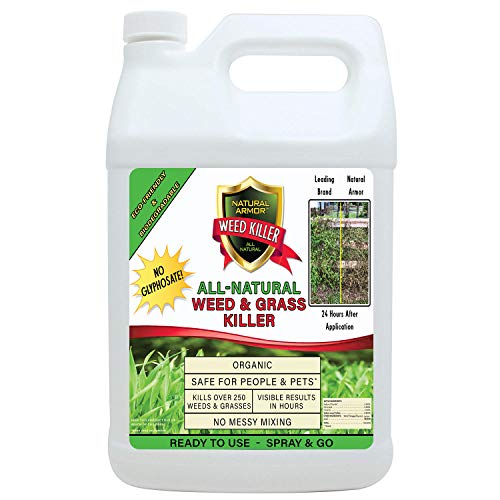





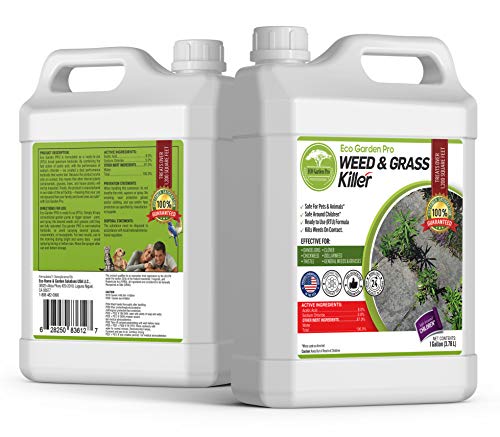

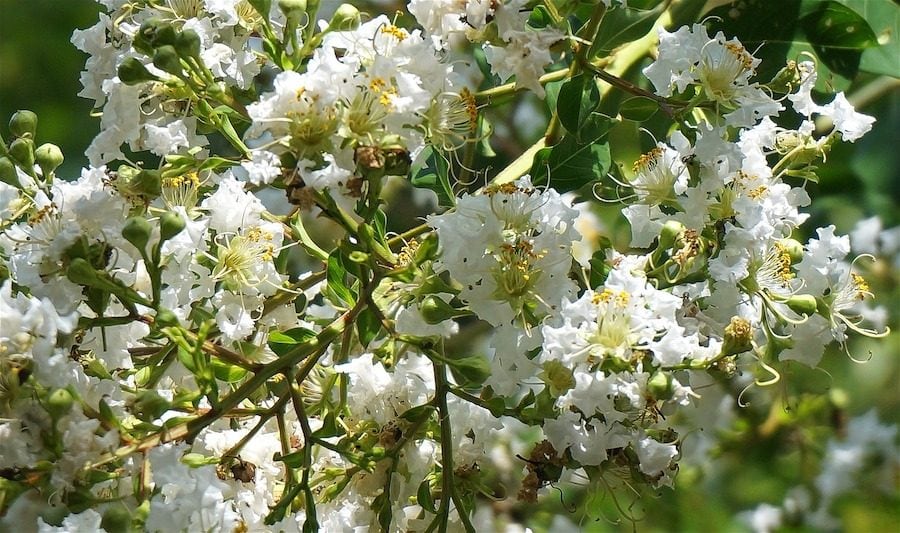






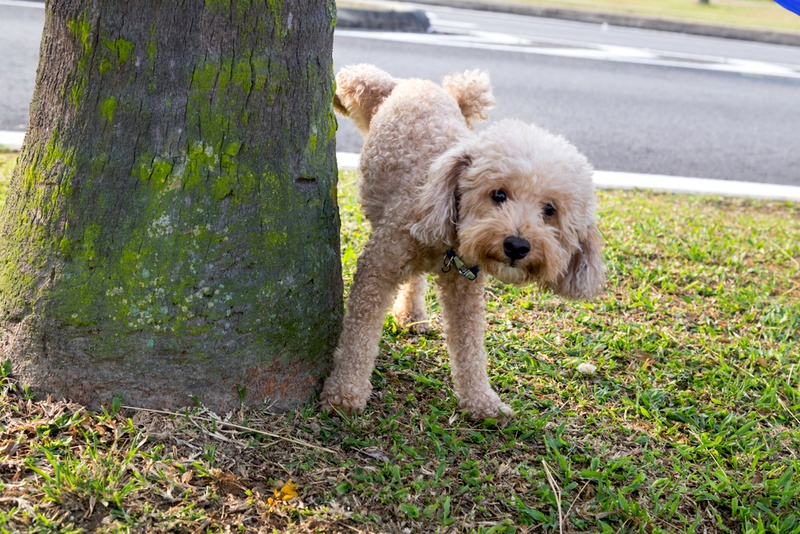
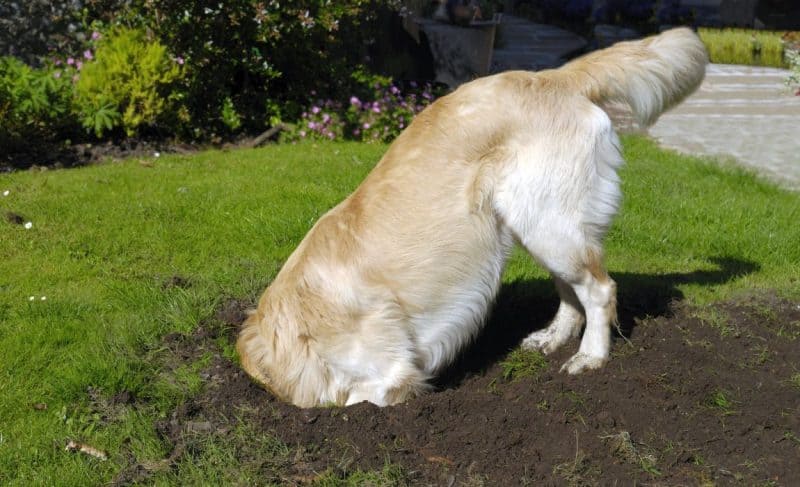
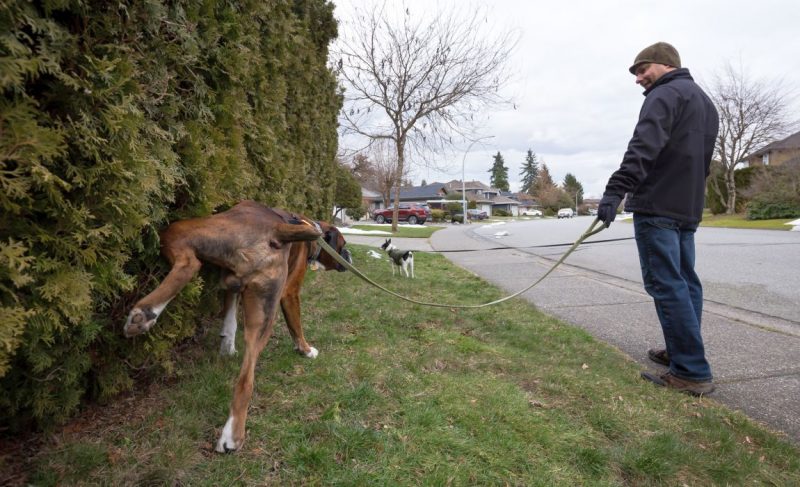

Leave a Comment